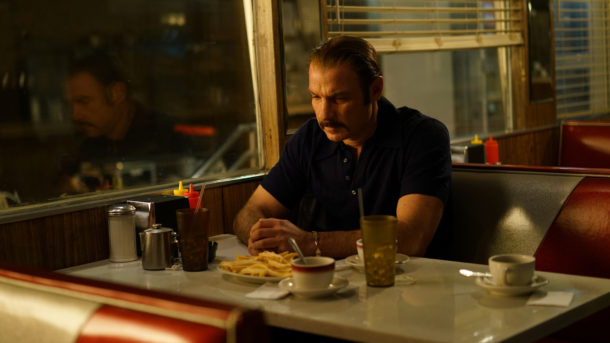 If the script for Rocky had not been produced in the mid 1970s and Martin Scorsese came upon the script several years later, there’s a good chance that the movie might’ve come out like the first two-thirds of Chuck, a film about the life of Chuck Wepner, the New Jersey boxer whose 1975 world title match against Muhammad Ali inspired Sylvester Stallone to write Rocky. Chuck combines Wepner’s real-life feel-good story with Wepner’s subsequent Goodfellas-like spiral into addiction and prison time set to a killer soundtrack of 1970s hits.
If the script for Rocky had not been produced in the mid 1970s and Martin Scorsese came upon the script several years later, there’s a good chance that the movie might’ve come out like the first two-thirds of Chuck, a film about the life of Chuck Wepner, the New Jersey boxer whose 1975 world title match against Muhammad Ali inspired Sylvester Stallone to write Rocky. Chuck combines Wepner’s real-life feel-good story with Wepner’s subsequent Goodfellas-like spiral into addiction and prison time set to a killer soundtrack of 1970s hits.
Wepner (Liev Schreiber) is a boxer from Bayonne, New Jersey who is known for his affable working-class character and his tendency to get cut in his matches — he is nicknamed “The Bayonne Bleeder.” He is given the chance of a lifetime when he faces Muhammad Ali (Pooch Hall) in what is expected to be an easy win for Ali. However, Wepner manages to nearly go the distance, lasting in the ring until Ali won by technical knockout in the fifteenth and final round. Wepner becomes an instant celebrity, and he soon receives a call that Sylvester Stallone (Morgan Spector) wants to base a movie on his life. The adulation goes straight to Wepner’s head, and while enjoying his celebrity he begins to make a series of poor life choices that leads him to prison.
Not surprisingly, Schreiber is the best part of the movie. He plays Wepner with the same charm that Stallone brings to Rocky, though unlike the heart-of-gold Italian Stallion the Bayonne Bleeder makes mistakes of character. We feel for his wife, Phyliss (Elisabeth Moss) and young daughter, but Schreiber never makes Wepner seem like a terrible person or an unsympathetic character — he makes bad choices, but isn’t a bad person.
Chuck is firing on all cylinders for roughly the first half of the film, but Wepner’s life doesn’t fit well in a traditional three-act screenplay structure, so the tightly-plotted first half of the film doesn’t deliver in the second half. The main issue is that the excitement of the Ali fight — which takes place halfway through the film — isn’t matched by anything in the second half of the narrative. Wepner’s struggles with his limited celebrity, escalating drug use, and confidence issues stemming from his personal issues — including trying to live up to the Rocky “Hollywood” image — start out compelling at first, but it follows the typical “spiraling drug addiction” cliches that you’ve seen in dozens of better movies (Also hurting the film is its terrible title — Chuck was originally titled The Bleeder when it made the international festival rounds last year, and while that name isn’t great either it was at least less generic).
Another unfortunate fallout from the movie losing steam is that characters other than Wepner are underdeveloped. These include Ron Perlman as Wepner’s manager, Jim Gaffigan as Wepner’s best friend, Michael Rapaport as Wepner’s brother, and Naomi Watts as Wepner’s later love interest. These are all talented actors, but their roles in Chuck don’t have much substance and all but Watts’ character disappear from the movie rather abruptly.
Though Chuck tries to follow the Rocky formula because of the similarities, a better model would have been Raging Bull because of the similar themes. Director Philippe Falardeau seems to decide late in the film that he is making a romantic film like Rocky, except that’s really not the most interesting angle to take in Wepner’s life story. I suggest you watch the ESPN 30 for 30 documentary The Real Rocky, which tells Wepner’s story better.

















Recent Comments